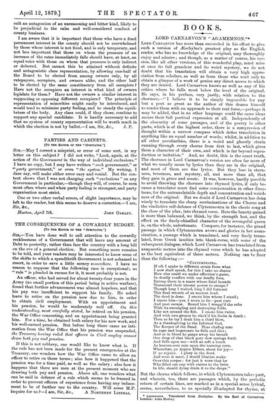THE CONSEQUENCES OF A COWARDLY BUDGET. ere THE EDITOR OF
THE SPECTATOR."
Sur,—You have done well to call attention to the cowardly recklessness of a G'o'vernment that will leave any amount of Debt to posterity, rather than face the country with a long bill on the eve of a general election. But something more remains to be told, and your readers may be interested to know some of the shifts to which a spendthrift Government is not ashamed to resort, in order to save a little money somewhere. I have no reason to suppose that the following case is exceptional; as rule" is pleaded in excuse for it, it most probably is not.
An officer, who had served for about twenty-four years in the Army (no small portion of this period being in active warfare), found that further advancement was almost hopeless, and that his pay was insufficient to support his family. He asked leave to retire on the pension now due to him, in order to obtain civil employment. With an appointment and his pension, he would be moderately well off. On this understanding, most carefully stated, he retired on his pension, -the War Office consenting, and an appointment being granted him. For a time, he obtained both salary for his new work, and his well-earned pension. But before long there came an inti- mation from the War Office that his pension was suspended, the Treasury having ruled that officers in Civil employ cannot draw both pay and pension.
If this is not robbery, one would like to know what is. If the rule has not been made for the present emergencies at the 'Treasury, one wonders how the War Office came to allow an officer to retire on these terms ; also how it happened that the pension was for a time paid, as well as the salary ; also how it happens that there are men at the present moment who are drawing both pay and pension. Above all, one wonders what can be said in defence of a rule which seems to be framed in order to prevent officers of experience from having any induce- ment to be of further use to the country. Will some M.P.


































 Previous page
Previous page